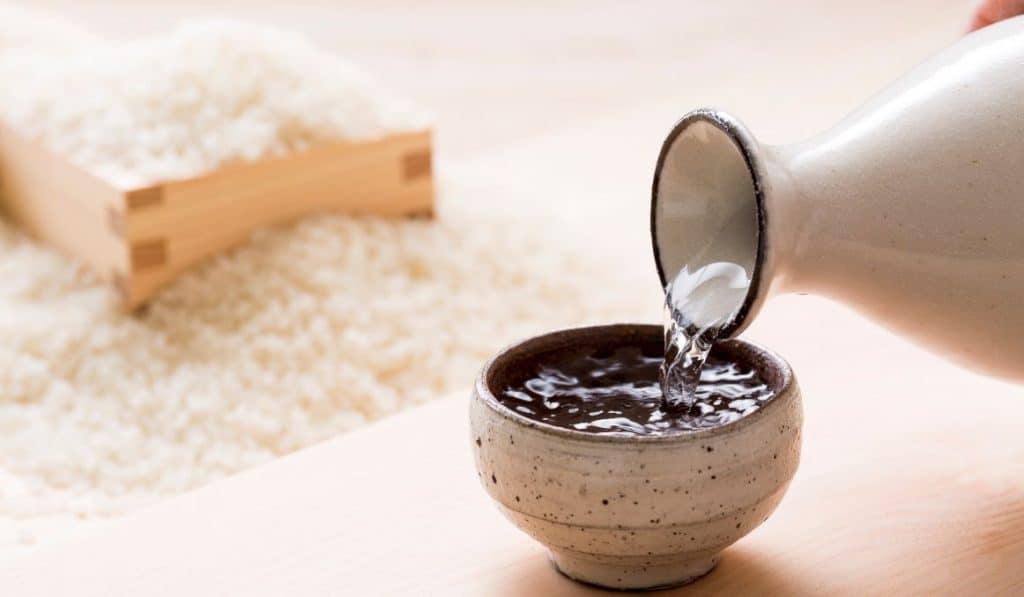Introduction
Sake, also known as Nihonshu, is a traditional Japanese alcoholic beverage made from fermented rice. It has a distinct flavor and is considered to be an important part of Japanese culture and cuisine. Sake is typically served warm or at room temperature and is enjoyed as an accompaniment to food or as an after-dinner drink.
It is important to know whether sake is keto-friendly because the consumption of alcoholic beverages can have an impact on a person’s ability to maintain ketosis. Alcohol has the potential to raise insulin levels, disrupt glucose metabolism, and increase calorie intake, which can negatively affect the progress of a ketogenic diet.
Therefore, it is essential for individuals following the ketogenic diet to be aware of the nutritional content of the alcoholic beverages they consume and determine whether they fit into their diet plan. The question of whether sake is ketogenic-friendly is an important one for individuals following the ketogenic diet to consider, and understanding the answer can help them make informed decisions about their alcohol consumption.
Nutritional Information of Sake

Carbohydrate Content in Sake
Sake contains carbohydrates in the form of rice, which is one of the main ingredients used in its production. The exact carbohydrate content of sake varies depending on the type of sake and the production method used, but it is typically higher than other alcoholic beverages such as wine and beer. A standard serving of sake (120 mL) contains approximately 7-10 grams of carbohydrates, which can have a significant impact on a person’s daily carbohydrate intake on a ketogenic diet.
Alcohol Content in Sake
Sake has an alcohol content of approximately 15-20% by volume, which is similar to that of wine. The alcohol content of sake can affect a person’s blood alcohol levels and metabolism, and can also contribute to an increase in calorie intake.
Other Nutrients Found in Sake
In addition to carbohydrates and alcohol, sake contains small amounts of other nutrients such as amino acids, vitamins, and minerals. However, these nutrients are present in such small quantities that they are not considered to have a significant impact on a person’s diet.
Comparison of Sake with Other Alcoholic Beverages
In terms of carbohydrate content, sake is typically higher in carbohydrates compared to other alcoholic beverages such as wine and beer. For example, a standard serving of wine contains approximately 3-5 grams of carbohydrates, while a standard serving of beer contains approximately 5-10 grams of carbohydrates. In terms of alcohol content, sake is similar to wine and has a lower alcohol content compared to beer, which typically has an alcohol content of 4-7% by volume.
Overall, it is important to keep in mind that the nutritional content of sake can vary widely depending on the type and brand of sake, and it is essential to check the label for specific information about the carbohydrate and alcohol content of the sake being consumed.
Effect of Sake on the Keto Diet

How Alcohol Affects Ketosis
Alcohol has the potential to affect ketosis in a number of ways. First, it has a tendency to raise insulin levels, which can slow down the breakdown of fat and reduce the body’s ability to use fat as a fuel source. Additionally, alcohol can also disrupt glucose metabolism, causing the liver to prioritize the breakdown of alcohol over the breakdown of fat. This can result in an increase in blood sugar levels, which can further reduce the body’s ability to maintain ketosis.
How Sake Consumption Affects Insulin Levels and Glucose Metabolism
The consumption of sake can have an impact on insulin levels and glucose metabolism due to its carbohydrate and alcohol content. The carbohydrates in sake can raise blood sugar levels, which can trigger the release of insulin, a hormone that regulates blood sugar levels. Elevated insulin levels can have a negative impact on ketosis, as it reduces the body’s ability to use fat as a fuel source. Additionally, the alcohol in sake can also disrupt glucose metabolism, causing the liver to prioritize the breakdown of alcohol over the breakdown of fat.
How Sake Consumption Affects the Calorie Intake for a Ketogenic Diet
The calorie content of sake can also have an impact on a ketogenic diet, as it can increase a person’s overall calorie intake. A standard serving of sake (120 mL) contains approximately 90-120 calories, which can add up quickly if a person consumes multiple servings in a single sitting. Additionally, the consumption of sake can also increase a person’s appetite, causing them to consume more food and further increase their calorie intake. This can make it more challenging for a person to maintain a calorie deficit, which is essential for promoting weight loss on a ketogenic diet.
In conclusion, the consumption of sake can have a negative impact on a person’s ability to maintain ketosis due to its carbohydrate and alcohol content, as well as its potential to increase insulin levels, disrupt glucose metabolism, and increase calorie intake. It is important for individuals following a ketogenic diet to be mindful of their sake consumption and make informed decisions about their alcohol consumption.
Keto-Friendly Options for Sake
Junmai-shu
Junmai-shu is a type of sake that is made from pure rice and water, without the addition of any distilled alcohol. This type of sake typically has a lower carbohydrate content compared to traditional sake, making it a potentially better option for individuals following a ketogenic diet. Junmai-shu is also known for its full-bodied flavor and rich, earthy taste, making it a popular choice among sake connoisseurs.
Ginjo-shu:
Ginjo-shu is a premium type of sake that is made using a more complex brewing process that includes the use of carefully selected yeast strains and a longer fermentation time. This type of sake is known for its fruity and floral flavor profile and is considered to be a higher quality option compared to traditional sake. The carbohydrate content of ginjo-shu may vary depending on the brand and type, but it is typically lower compared to traditional sake, making it a potentially better option for individuals following a ketogenic diet.
Daiginjo-shu:
Daiginjo-shu is a super premium type of sake that is made using the finest quality rice and water, as well as an even more complex brewing process that involves a longer fermentation time and a greater degree of precision. This type of sake is known for its delicate and nuanced flavor profile, and is considered to be the highest quality option among all types of sake. The carbohydrate content of daiginjo-shu may vary, but it is typically lower compared to traditional sake, making it a potentially better option for individuals following a ketogenic diet.
Nigorizake:
Nigorizake is an unfiltered type of sake that is known for its cloudy appearance and creamy, rich flavor. This type of sake is made using a process that involves leaving small amounts of the rice solids in the final product, which contributes to its unique flavor and texture. The carbohydrate content of nigorizake may vary, but it is typically lower compared to traditional sake, making it a potentially better option for individuals following a ketogenic diet.
Comparison of These Options with Traditional Sake:
When compared to traditional sake, the keto-friendly options of junmai-shu, ginjo-shu, daiginjo-shu, and nigorizake are typically lower in carbohydrates, making them potentially better options for individuals following a ketogenic diet. These types of sake are also known for their unique flavor profiles, which may appeal to individuals who enjoy the taste of sake. However, it is important to note that the exact carbohydrate content of these types of sake can vary widely depending on the brand and type, and it is essential to check the label for specific information about the carbohydrate content of the sake being consumed.
In conclusion, for individuals following a ketogenic diet who wish to enjoy sake, keto-friendly options such as junmai-shu, ginjo-shu, daiginjo-shu, and nigorizake may be a better choice compared to traditional sake due to their potentially lower carbohydrate content. It is important to check the label for specific information about the carbohydrate content of the sake being consumed, and to make informed decisions about alcohol consumption.
Net Carb Calculator for Sake
To calculate the net carbs in sake, you will need to subtract the fiber and sugar alcohols from the total carbohydrates. Here is a simple formula to use:
Net Carbs = Total Carbohydrates – Fiber – Sugar Alcohols
Here’s an example calculation using a sake with the following nutrition information:
Total Carbohydrates: 10g
Fiber: 0g
Sugar Alcohols: 2g
Net Carbs = 10g – 0g – 2g = 8g
This means that for every serving of this sake, there are 8g of net carbs. Keep in mind that different brands and types of sake may have different nutritional information, so it is important to always check the label and do the calculation to determine the net carbs for the specific sake you are consuming. Additionally, it is recommended to limit alcohol consumption, including sake, while following a ketogenic diet.
Conclusion
Sake is a traditional Japanese alcoholic beverage made from fermented rice, water, and yeast. The carbohydrate content of sake can vary depending on the type and brand, but traditional sake typically has a higher carbohydrate content compared to other alcoholic beverages. Alcohol consumption can affect ketosis and insulin levels, and consuming high-carbohydrate alcoholic beverages can negatively impact the results of a ketogenic diet. However, there are keto-friendly options available such as junmai-shu, ginjo-shu, daiginjo-shu, and nigorizake, which are typically lower in carbohydrates compared to traditional sake.
For individuals following a ketogenic diet, it is recommended to choose keto-friendly options such as junmai-shu, ginjo-shu, daiginjo-shu, or nigorizake, and to check the label for specific information about the carbohydrate content of the sake being consumed. It is also important to be mindful of portion sizes and to limit alcohol consumption in general, as alcohol can negatively impact ketosis and insulin levels.
While sake can be a potentially keto-friendly option for individuals following a ketogenic diet, it is important to make informed decisions about alcohol consumption and to choose options that align with the goals of a ketogenic diet. Additionally, there are other keto-friendly alcoholic beverage options available, such as wine, spirits, and low-carbohydrate beer, which can be enjoyed in moderation. It is recommended to check the label for specific information about the carbohydrate content of any alcoholic beverage being consumed, and to speak with a healthcare professional for personalized advice.
Frequently Asked Questions
Q: Is sake keto-friendly?
A: The keto-friendliness of sake depends on the type and brand of sake, as well as the individual’s personal goals and restrictions on a ketogenic diet. Some types of sake, such as junmai-shu, ginjo-shu, daiginjo-shu, and nigorizake, are lower in carbohydrates compared to traditional sake, making them potentially keto-friendly options. It is important to check the label for specific nutritional information and to limit alcohol consumption in general while following a ketogenic diet.
Q: How does sake affect ketosis?
A: Alcohol consumption, including sake, can negatively impact ketosis and insulin levels. Alcohol can cause an increase in insulin, leading to glucose metabolism, and can also interfere with the body’s ability to utilize ketones for energy. Consuming high-carbohydrate alcoholic beverages, such as traditional sake, can also increase calorie intake and negatively impact the results of a ketogenic diet.
Q: What is the difference between junmai-shu, ginjo-shu, daiginjo-shu, and nigorizake?
A: Junmai-shu is a pure rice sake, meaning that only rice, water, yeast, and koji mold are used in its production. Ginjo-shu and daiginjo-shu are premium and super premium sakes, respectively, made from rice that has been polished to a greater extent, resulting in a lower carbohydrate content compared to traditional sake. Nigorizake is an unfiltered sake that is also lower in carbohydrates compared to traditional sake.
Q: How much sake can I have on a ketogenic diet?
A: The amount of sake that can be consumed on a ketogenic diet will depend on the specific type and brand of sake, as well as the individual’s personal goals and restrictions. It is important to limit alcohol consumption in general while following a ketogenic diet, as alcohol can negatively impact ketosis and insulin levels. Additionally, it is recommended to check the label for specific nutritional information and to be mindful of portion sizes.
Q: Can I drink sake on a strict ketogenic diet?
A: Drinking sake, like any alcoholic beverage, can be consumed in moderation while following a strict ketogenic diet. However, it is important to keep in mind that alcohol can negatively impact ketosis and insulin levels, as well as increase calorie intake. To minimize these effects, it is recommended to choose a keto-friendly option such as junmai-shu, ginjo-shu, daiginjo-shu, or nigorizake and to limit alcohol consumption in general. Additionally, it is important to stick to a strict and balanced ketogenic diet, including measuring portions and counting macros to ensure that your diet remains in a state of ketosis.

Meet Yasir here! As a blogger for over six years, my passion has never faded. I love writing in a variety of niches including weight loss and Keto Diet. I am an enthusiastic blogger and writing geek. I am known for honest product reviews and am always looking for the latest and greatest technology. I have been blogging for over six years, and my articles are featured on some of the top websites. When I am not writing, I spend time with my family or working on my next big project. Cheers!








